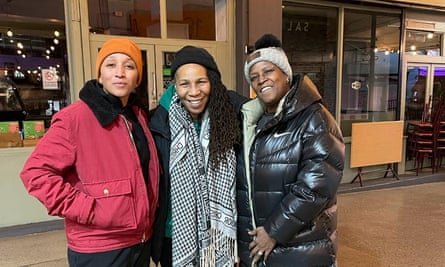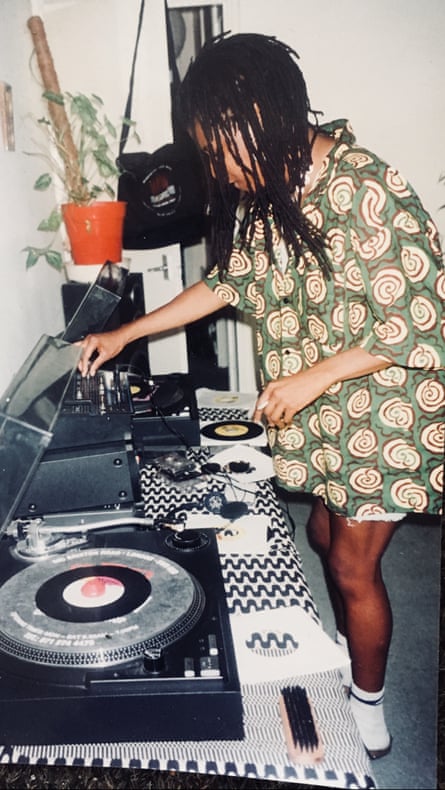On a February morning in Brixton, old friends Yvonne Taylor and Eddie Lockhart are laughing about their first forays into London’s lesbian nightlife – and how they eventually went on to transform it. In 1984, Taylor moved from Nottingham to London and found the women-only clubs to be “torture”.
“There was a real concentration of women’s bars in Islington,” she recalls. “Islington had a lot of derelict properties and so there were a lot of lesbian community homes set up in them, and as a result there was a surge, certainly from the 70s, of these lesbians’ bars. But they were bars directed to white lesbians and touristy lesbians from the ’burbs.”
Taylor, now 63, and Lockhart, also known as DJ Shineye, 62, found the “music policy” of women-only clubs limited to “pop nonsense” and “old 50s numbers”.
“I knew that there was more music than what the DJs at the time were spinning and I had the fire in my belly that I needed to change this,” says Lockhart. “I knew that I wanted people who looked like me to be able to go to a space where they felt comfortable, and where they weren’t going to encounter any elements of racism and hostility that were very much there.”
Taylor and Lockhart met when Taylor’s then-partner was invited to a dinner that Lockhart was attending. The two immediately bonded over their shared experiences as Black lesbians navigating London’s women’s scene. “Eddie put forward the idea of doing this sound system run by women of colour,” says Taylor, who had prior DJing experience. “And literally by the time we’d left the flat, there was a plan in place. That was the first time we’d met, we just hit it off!”
Two years later, the pair launched the Sistermatic collective with their friends Sharon Lee and Lorna Edwards. Lifelong south London resident Lockhart had little interest in jumping through the kind of bureaucratic hoops often required of community-based projects, and instead went directly to South London Women’s Centre in Brixton with her proposal. They both remember Sistermatic’s launch night. Taylor had been in charge of PR, which involved promoting the event through flyers and word-of-mouth. “We’d done our own food, we’d brought our own bar,” she says, grinning. “In those days it was less of a licensing thing, but we got away with it!”
They were “packed from the get-go”, says Taylor. Lockhart describes it as “euphoric”: “At the end of the day, they hadn’t had anything like that before and this was something different. The fire in my belly said: it’s going to work. I think people were actually quite surprised by it happening, and having somewhere to go. And we continued it on a monthly basis.”
For Taylor, a surprising aspect of Sistermatic was the broad demographic of women they would attract – not only Black women, but also south Asian women and white women who didn’t fit into the mainstream lesbian scene – all coming together to groove to soul, R&B, house and lovers rock. “We were probably one of the first lesbian clubs to hit the eclecticism of the community. We had women who were into S&M, butch dykes, femme dykes, it was a melting pot. I think we broke down a few barriers and mystiques that we had about each other, and it also did a lot to change the nature of how Black women related to each other, because obviously for them it was more difficult to come out.”
Taylor remembers ending the first party, sweeping people out at 10am – “it was a proper shebeen, man!” – and treating themselves to breakfast “because we made money as well, and we couldn’t believe that!”
But few, if any, photographs exist from those days beyond rave flyers – Sistermatic was intentionally restrictive around the use of cameras to prioritise the safety of attendees. Taylor remembers the custody struggles of bisexual and lesbian mothers in the 1980s: “There were lots of mothers who didn’t want their ex-husbands to come across photographs of them in the club and then use that to get the kids back.”
after newsletter promotion
Sistermatic was as dedicated to its patrons’ lives as it was giving them a good time. The Women’s Centre also meant Sistermatic could be more than just a club, but a community – “there was a cafeteria, where people could have food, have drinks, exchange words, and then they could go and dance,” says Lockhart. She had also chosen the venue because of its amenities: “I wanted a space where I could create a creche with a qualified worker there for mothers who had small children and couldn’t afford babysitters or nannies.” Mothers were not charged for use of the creche, which was financed collectively through the entrance fee.
Sistermatic ran until 1995 when the Women’s Centre lost its funding. Lockhart says that the company that leased the premises to the Women’s Centre eventually raised the rent to a level that local authorities were not prepared to fund. Despite fundraising attempts, the centre and Sistermatic closed.
Lockhart and Taylor, however, had established themselves as kingpins of Black queer sound and found themselves booked as DJs for Southall and Southwark Women’s Centres, as well as birthday parties and Pride events. They had set a precedent too – by 1997, the Black women’s night Precious Brown, run by Ain Bailey and DJ Marilyn, emerged at the Candy Bar in Soho, where Yvonne was working at the time.

Twenty-seven years on, Sistermatic is set to return, hosting a street party in Brixton Village on 17 February to celebrate LGBTQ+ History Month. For Lockhart and Taylor, it’s an opportunity to explore the intergenerational pathways of music. Take Afrobeats, says Lockhart: “It’s linked with soca, elements of reggae, lovers rock – it’s got so much mixed in there.”
Joining forces with Nite Dykez, a monthly night and collective which celebrates love for electronic music among Black queer women, they hope to “encourage intergenerational work with younger lesbians”, says Lockhart.
“Because the way the system’s set up at the moment, there’s not a lot of intergenerational stuff being done – and not enough of it,” adds Taylor. “The wheel can’t be reinvented – you can just improve that wheel and how it works.” Although for now it’s a one-off event, Taylor sees it as the opportunity to begin a journey of education for younger people about the history of music and Black queer culture in Britain – and for their elders to teach them a move or two. “We’re trying to get people from that youth market to party with their auntie.”

